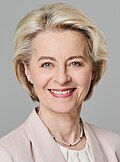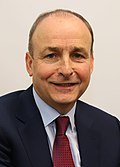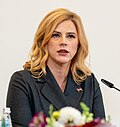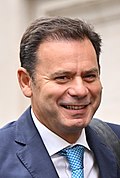| # | Member | Position | State | Membership | Last affiliation |
|---|
| 1 | Jean-Claude Juncker | Prime Minister |  Luxembourg Luxembourg | 20 January 1995 – 4 December 2013 | 18 years, 318 days | | EPP |
| Commission President |  European Union European Union | 1 November 2014 – 30 November 2019 | 5 years, 29 days |
| 23 years, 347 days |
| 2 | Helmut Kohl | Chancellor |  Germany Germany | 1 October 1982 – 27 October 1998 | 16 years, 26 days | | EPP |
| 3 | Angela Merkel | Chancellor |  Germany Germany | 22 November 2005 – 8 December 2021 | 16 years, 16 days | | EPP |
| 4 | Viktor Orbán | Prime Minister |  Hungary Hungary | 29 May 2010 – present | 15 years, 223 days | | PfE |
| 5 | Jacques Santer | Prime Minister |  Luxembourg Luxembourg | 20 July 1984 – 20 January 1995 | 10 years, 190 days | | EPP |
| Commission President |  European Union European Union | 25 January 1995 – 15 March 1999 | 4 years, 49 days |
| 14 years, 238 days |
| 6 | François Mitterrand | President |  France France | 21 May 1981 – 17 May 1995 | 13 years, 361 days | | S&D |
| 7 | Donald Tusk | Prime Minister |  Poland Poland | 16 November 2007 – 22 September 2014 | 6 years, 310 days | | EPP |
| Council President |  European Union European Union | 1 December 2014 – 30 November 2019 | 4 years, 364 days |
| Prime Minister |  Poland Poland | 13 December 2023 – present | 2 years, 25 days |
| 13 years, 334 days |
| 8 | Mark Rutte | Prime Minister |  Netherlands Netherlands | 14 October 2010 – 2 July 2024 | 13 years, 262 days | | Renew |
| 9 | Wilfried Martens | Prime Minister |  Belgium Belgium | 3 March 1979 – 6 April 1981 | 2 years, 34 days | | EPP |
| 17 December 1981 – 7 March 1992 | 10 years, 81 days |
| 12 years, 115 days |
| 10 | José Manuel Barroso | Prime Minister |  Portugal Portugal | 6 April 2002 – 17 July 2004 | 2 years, 102 days | | EPP |
| Commission President |  European Union European Union | 22 November 2004 – 31 October 2014 | 9 years, 343 days |
| 12 years, 80 days |
| 11 | Jacques Chirac | President |  France France | 17 May 1995 – 16 May 2007 | 11 years, 364 days | | EPP |
| 12 | Robert Fico | Prime Minister |  Slovakia Slovakia | 4 July 2006 – 8 July 2010 | 4 years, 4 days | | Una. |
| 4 April 2012 – 22 March 2018 | 5 years, 352 days |
| 25 October 2023 – present | 2 years, 74 days |
| 12 years, 65 days |
| 13 | Ruud Lubbers | Prime Minister |  Netherlands Netherlands | 4 November 1982 – 22 August 1994 | 11 years, 291 days | | EPP |
| 14 | Margaret Thatcher | Prime Minister |  United Kingdom United Kingdom | 4 May 1979 – 28 November 1990 | 11 years, 208 days | | ECR |
| 15 | Bertie Ahern | Taoiseach |  Ireland Ireland | 26 June 1997 – 7 May 2008 | 10 years, 316 days | | ECR |
| 16 | Göran Persson | Prime Minister |  Sweden Sweden | 22 March 1996 – 6 October 2006 | 10 years, 198 days | | S&D |
| 17 | Poul Schlüter | Prime Minister |  Denmark Denmark | 10 September 1982 – 25 January 1993 | 10 years, 137 days | | EPP |
| 18 | Felipe González | Prime Minister |  Spain Spain | 1 January 1986 – 5 May 1996 | 10 years, 125 days | | S&D |
| 19 | Tony Blair | Prime Minister |  United Kingdom United Kingdom | 2 May 1997 – 27 June 2007 | 10 years, 56 days | | S&D |
| 20 | Klaus Iohannis | President |  Romania Romania | 21 December 2014 – 12 February 2025 | 10 years, 53 days | | EPP |
| 21 | Jacques Delors | Commission President |  European Union European Union | 7 January 1985 – 24 January 1995 | 10 years, 17 days | | S&D |
| 22 | Charles Michel | Prime Minister |  Belgium Belgium | 11 October 2014 – 27 October 2019 | 5 years, 16 days | | Renew |
| Council President |  European Union European Union | 1 December 2019 – 30 November 2024 | 4 years, 365 days |
| 10 years, 15 days |






























